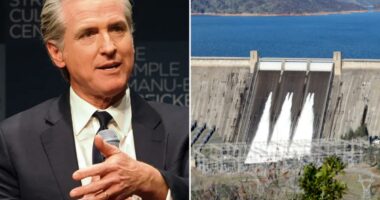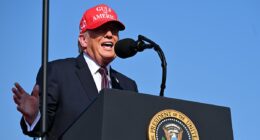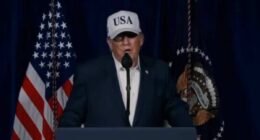Share this @internewscast.com
By Dan Hannan
WHAT a humiliation. We have given Brussels everything it wanted and ended up paying for the privilege.
Sir Keir Starmer always hated Brexit. For three years, he campaigned to overturn the referendum.
Now, unable to go back in, has agreed that Brussels should set our laws from the outside.
We will remain a non-participating member, an obligatory market for EU exports, a source of fish for French and Spanish fishermen, and a provider of soldiers for EU missions, as well as subsidized university seats for the children of EU officials.
Britain will become the EU’s gimp, trussed up in black leather and zips, with a ball-gag in its mouth.
And all because, since 2016, Starmer has felt a deep emotional need to apologise on behalf of the British electorate.
To see how one-sided the agreement is, let’s think of what the two sides’ objectives were before.
The EU had an extensive agenda. Since Donald Trump essentially retracted the US security promise from Europe, EU leaders have sought Britain’s assistance—a nuclear nation with the most formidable military in the area—to help fill the gap.
They wanted continued access to the richest fishing grounds in Europe, something that was supposed to be phased out gradually after Brexit.
They wanted to send their unemployed youngsters here and to continue to educate their children at UK universities without paying overseas fees.
Most importantly, they aimed to influence our trade policy. The UK stands as their largest export destination for agricultural products. Their ongoing concern was that Britain could remove the barriers imposed by Brussels on non-EU imports, which are often portrayed as consumer protection measures but are primarily intended to limit competition.
If Britain were to follow the science and remove these barriers, it would cease to be a captive market. Beef from Australia, Uruguay, the US and Canada would replace imports from France and Ireland.
To prevent that outcome, it was not enough for Britain to adopt the same food standards as the EU. No, we had to cede control. We had to let the EU set our food standards in perpetuity.
The agreement just signed makes it impossible for British farmers to get a competitive edge in areas like gene editing. It could force us to undo the reforms we have made over the past four years and might threaten our existing trade deals.
So much for what the EU wanted. What of Britain?
Actually, our position was pretty comfortable. We already hadthe most comprehensive deal that the EU has with any state not in the process of joining it, with no tariffs or quotas. We had finally started to use our Brexit freedoms to be more competitive in fields like AI.
We had struck trade deals with the Pacific bloc, India and (much to Eurocrats’ annoyance) the US.
No, the only real irritation we had, a legacy of the Benn Surrender Act, when Europhile MPs prevented us from leaving the EU other than on terms that Brussels approved, was checks at the Irish border.
The only fair way to dismantle those checks was to agree a mutual recognition deal on food. We would accept stuff that the EU passed as fit, and they would do the same. Brussels has long had such a deal with New Zealand, and our standards are closer to its own than those of Kiwi exporters.
But mutual recognition would not keep the UK as a captive export market. So the EU held out for total control, what it called “dynamic alignment” (though few things are less dynamic than the EU).
Naturally, it has got its way. On this, as on every other issue, Labour has been reduced to pretending that, in giving in to the EU, it is somehow getting what it wanted all along.
Thus handing Brussels control of our regulations becomes “easier exports”.
Caving into EU demands on free movement becomes “a balanced youth experience scheme”. Though how anyone can justify giving EU students a better deal than Commonwealth students is utterly beyond me.
To see how totally we have caved in, consider what ministers are trumpeting as their big victory, namely the ability to use EU passport e-gates. It is extraordinary that this right was ever withdrawn. We have always allowed EU nationals to use our gates, and quite right, too: we want our airports to be efficient.
If the EU wants to treat e-gates as a bargaining chip, the bargain should be simple reciprocity: you use ours, we use yours. But, no, to get even something so basic, we make a bunch of unrelated concessions.
And to cap it all, we are paying the EU unspecified sums for accepting all these concessions.
That is what happens when our leaders can’t forgive us for Brexit. Labour negotiates, Britain loses.















